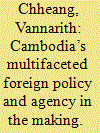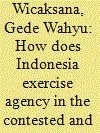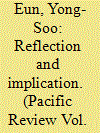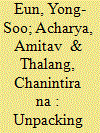|
|
|
Sort Order |
|
|
|
Items / Page
|
|
|
|
|
|
|
| Srl | Item |
| 1 |
ID:
186120


|
|
|
|
|
| Summary/Abstract |
Amidst the evolving multifaceted and decentralized world, weak state actors are compelled to regularly and robustly revisit and readjust their foreign policy policies to meet national interests. Although Cambodia has limited material resources and faces constant foreign intervention, it does not mean that Cambodia is not entirely without agency. Within the context of rising fluidity and multiplicity of the international system, weak states have certain strategic space to manoeuvre. Cambodia has been adjusting its foreign policy posture to adapt to and navigate the fast-changing geopolitical landscapes and trends to maintain its independence and strategic autonomy. By doing so, it can survive and thrive. The paper argues that Cambodia prioritizes its domestic agenda and interests, exercises a hedging strategy to mitigate risks, advances multilateralism and strengthens ASEAN-driven regional architecture.
|
|
|
|
|
|
|
|
|
|
|
|
|
|
|
|
| 2 |
ID:
186116


|
|
|
|
|
| Summary/Abstract |
Recent developments in the Asia-Pacific or Indo-Pacific region have illustrated the emergence of a contested region and unfolding regional order. Within the multiplicity, as argued in the introduction of the special issue, all stakeholders, including the weak state actors, not necessarily the superior ones, are participating in the process of order-building. This article looks at how Indonesia, the largest member country of ASEAN, pursues its agency amid the contested regional formulations between China and the US. The argument is that Indonesia promotes its concept of a rules-based interaction beyond the dominant great power politics, as a potential agency enabling the creation of a pluralised regional order. This agential position provides the basis to rethink the relevance of the established conceptual framework of hedging commonly used to understand small and middle powers’ foreign policies toward the major players. The author sees that Indonesia hedges in different ways, demonstrating a distinct conceptualisation which is likely to make a contribution to the project of Global IR.
|
|
|
|
|
|
|
|
|
|
|
|
|
|
|
|
| 3 |
ID:
186111


|
|
|
|
|
| Summary/Abstract |
In line with the themes presented in the introduction to this special issue, this article explores what impact twenty-first century global politics has had on Thailand’s agency. It is argued that while multi-dimensional challenges of the current world order have posed fewer constraints on Thailand’s capability to achieve intended outcomes, internal political instability and the U.S. ambivalence towards Southeast Asia on the whole complicates how Thailand navigates its position amidst the U.S.-China rivalry. However, these complications should not be construed as factors that restrict agency. Despite maintaining a close relationship with China, Bangkok has managed to find various ways to enhance its ability to achieve intended outcomes in order to protect the country’s autonomy. Based on Thailand’s experience, this article reveals the importance of using more open-ended approaches that pay equal attention to factors that complicate, enhance and constrain weaker state agency at both the domestic and international levels. It also offers opportunities for further research into non-material sources of state agency.
|
|
|
|
|
|
|
|
|
|
|
|
|
|
|
|
| 4 |
ID:
186113


|
|
|
|
|
| Summary/Abstract |
Despite terminological variations used to characterize Myanmar’s foreign policy within the extant literature, in practice Myanmar has adopted a foreign policy of neutrality and non-alignment since independence to avoid being drawn into global and regional post-World War II power struggles. As realist perspectives suggest, Myanmar’s behavior is a rational choice derived from inherent limitations that a typical weaker state must inevitably conform to the systemic pressures and changes. However, as the discussion illustrates, a weaker state can also be relatively autonomous and possess the ability to pursue independent foreign policies in relation to more powerful states at the international level while dealing with unit-level domestic security problems and challenges. Meanwhile, it is essential not to treat the state as a cohesive unit, as commonly done within existing IR theories based on the experiences of the West. Rather, the state should be treated as a fragmented unit in which its segments possess varying degrees of agency to interact and leverage with other actors at both the international and domestic levels. In order to understand Myanmar’s foreign policy behavior, this article examines how the country has actualized its avenue of agency in coping with both the fluidity of international order and the multidimensional internal instability.
|
|
|
|
|
|
|
|
|
|
|
|
|
|
|
|
| 5 |
ID:
186122


|
|
|
|
|
| Summary/Abstract |
This article elaborates on the following two questions and their implications. First, how can we as analysts offer compelling explanations for weak states’ agency and behaviours in the current global political and economic environments marked by multiplicity and fluidity? Second, what are the major causal factors that enable or influence weak actors’ agency, and under what conditions is their agency facilitated or constrained? Although an extensive literature in the discipline of International Relations (IR) confirms that today’s world is highly complex and diverse in terms of who or what matters in global politics, the subject of weak states and their agency is still not adequately discussed. Furthermore, the issues of methodology and theorising for the subject remain uncharted territory. By reflecting upon the main arguments and empirical findings of our special issue, this concluding article makes a case for ‘open-ended’ analytic eclecticism as an alternative methodological/analytical scheme, and lays preliminary ground for theorising weak states’ agency in the changed and changing global environments in the twenty-first century.
|
|
|
|
|
|
|
|
|
|
|
|
|
|
|
|
| 6 |
ID:
186109


|
|
|
|
|
| Summary/Abstract |
This introductory article provides rationales and contextual background for the special issue which examines how weak states in Asia actualise and exercise their agency in the twenty-first century regional or global environments. The article opens with a consideration of why attention is drawn to the agency of the weak. Weak states are often treated as ‘objects’ of international politics rather than ‘subjects’, and their foreign policy actions are commonly taken to be ‘reflexive’ of external constraints, such as fluctuations in the balance of power in the international system. We disagree with this view. We argue that weak actors can demonstrate varieties of agency regardless of their position in the international system in terms of material capabilities. To clarify this point, the article reflects on the changed and changing global and regional environments and order. Rather than seeing them through the lens of great power politics and its signature concept of ‘polarity’, the article offers an alternative notion, namely a ‘multiplex’ world, and identifies the key nature of order therein: multiplicity and fluidity. Both material and normative power have already and continue to become fragmented, decentralised, and dispersed within and across states. While emphasising that such a multifaceted and fluid world opens up a wide avenue of agency for weak actors, this article also notes that the weak has varieties of agency as potentials.
|
|
|
|
|
|
|
|
|
|
|
|
|
|
|
|
| 7 |
ID:
186119


|
|
|
|
|
| Summary/Abstract |
The world is witnessing a dual process of power shift from West to East and power diffusion from the major states to the lower layers of the global power structure. However, inadequate scholarly endeavour is devoted to exploring the foreign policy thinking and practices of weaker states amid these dynamics. This paper analyses the changing patterns of Vietnam’s post-Cold War worldview, its engagement with the regional security order, particularly its current threat perception and strategic response to regional challenges such as China’s rise and the South China Sea disputes. It will trace how Vietnam, previously perceived as a small to medium country, has increased its agency in the twenty first century to the extent that an emerging middle power can maneuver in a multifaceted and fluid world. It argues from the case of Vietnam that weaker states are not merely dictated by structural developments but may now have greater agency in contributing to shaping regional or world orders. Such investigation will help enrich both the existing Western-dominated and structure-oriented accounts on small and middle powers.
|
|
|
|
|
|
|
|
|
|
|
|
|
|
|
|
|
|
|
|
|